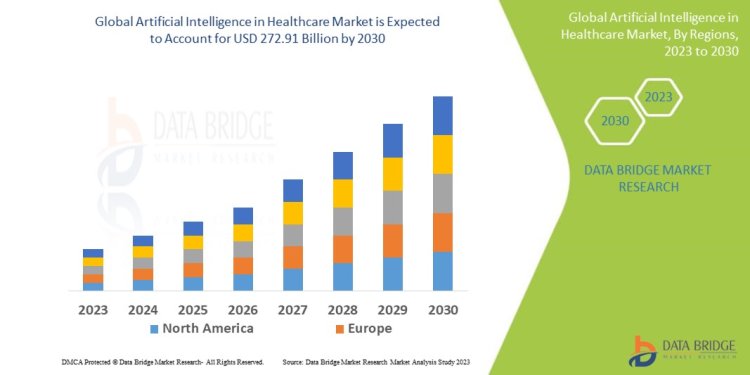Artificial Intelligence in Healthcare Market Scope: Growth, Share, Value, Size, and Analysis
The global artificial intelligence in healthcare market was valued at USD 22.23 billion in 2024 and is expected to reach USD 629.09 billion by 2032 During the forecast period of 2025 to 2032 the market is likely to grow at a CAGR of 51.87%, primarily driven by the increasing adoption of AI technologies for medical imaging, diagnostics, and personalized treatments

Introduction to AI in Healthcare
Artificial Intelligence in healthcare is reshaping the industry. From faster diagnostics to personalized treatments, AI improves clinical outcomes while streamlining operations.
Simply put, AI healthcare solutions use machine learning, natural language processing (NLP), and big data analytics to assist in patient care, predictive modeling, and operational efficiency.
Over the years, AI evolved from basic data handling to complex clinical decision support systems (CDSS), marking a new era of digital healthcare transformation.
Current Market Overview
Market Size and Growth
The AI healthcare market was valued at over $11 billion in 2023, with a projected CAGR of 40-50% through 2030. It's expected to surpass $100 billion as demand for intelligent healthcare systems surges globally.
Key Market Players
Leading names include IBM Watson Health, Google Health, Microsoft Azure Healthcare, and emerging innovators like PathAI and Tempus. These players drive R&D, strategic AI healthcare partnerships, and groundbreaking tech adoption.
Major Applications of AI in Healthcare
AI in Medical Imaging
AI enhances radiology by detecting anomalies in X-rays, CT scans, and MRIs. Algorithms like Google’s DeepMind achieve near-human or even superhuman diagnostic accuracy, reducing human error.
AI in Drug Discovery
AI drug discovery platforms like Atomwise shorten drug development cycles, identify viable compounds faster, and lower R&D costs, revolutionizing pharmaceutical innovation.
AI for Personalized Medicine
AI tailors treatments based on genetic profiling, patient history, and lifestyle data. Precision medicine powered by AI ensures more effective, patient-centric therapies with fewer side effects.
AI in Predictive Analytics
Through predictive healthcare analytics, AI forecasts disease outbreaks, hospital readmissions, and treatment responses, enabling early interventions and smarter healthcare resource management.
Benefits of AI in Healthcare
Improved Diagnosis
AI’s pattern recognition capabilities enable faster, more accurate diagnoses in areas like oncology, neurology, and cardiology, reducing human oversight and boosting patient outcomes.
Cost Efficiency
Automation of administrative tasks, predictive maintenance, and early diagnosis contribute to significant healthcare cost reductions, benefiting both providers and patients.
Enhanced Patient Experience
AI improves patient engagement through chatbots, virtual nursing assistants, and remote monitoring, offering 24/7 support and personalized healthcare journeys.
Challenges and Limitations
Data Privacy Issues
With massive reliance on patient data, concerns over HIPAA compliance, GDPR rules, and cybersecurity breaches are major hurdles for AI adoption.
Regulatory and Ethical Dilemmas
Lack of clear AI healthcare regulations, potential algorithmic bias, and accountability questions challenge the ethical deployment of AI technologies.
Adoption Barriers
Interoperability issues, lack of AI-trained professionals, and legacy systems delay the smooth integration of AI in traditional healthcare environments.
Regional Market Analysis
North America
North America dominates, thanks to robust tech ecosystems, government support, and high healthcare expenditure.
Europe
Europe’s AI healthcare market grows steadily, driven by ethical AI initiatives and government-backed health tech innovations.
Asia-Pacific
Asia-Pacific, especially China, India, and Japan, is a rapidly expanding AI market, fueled by government AI strategies and rising healthcare demands.
Rest of the World
Emerging markets in Latin America, Middle East, and Africa are adopting mobile health applications and AI telemedicine solutions despite infrastructural challenges.
Future Trends in AI Healthcare
Wearable Devices and Remote Monitoring
AI-enabled wearables like smartwatches monitor vitals in real-time, improving preventive healthcare and enhancing remote patient monitoring systems.
IoT, Big Data, and AI Integration
Combining IoT devices with AI analytics and big data leads to smart hospitals, predictive maintenance, and highly efficient healthcare delivery.
AI in Genomics and Biotechnology
AI deciphers genomic data to enable personalized medicine, gene editing, and targeted biotechnology innovations, creating a new frontier in preventive healthcare.
Conclusion
The Artificial Intelligence in Healthcare Market is booming, offering better diagnostics, lower costs, and superior patient experiences.
However, issues like data security, regulatory frameworks, and technology gaps must be addressed.
The future of healthcare is smart, predictive, and deeply personalized—powered by AI.
Get More Details : https://www.databridgemarketresearch.com/reports/global-artificial-intelligence-in-healthcare-market
Get More Reports :
https://www.databridgemarketresearch.com/reports/global-intercom-devices-market
https://www.databridgemarketresearch.com/reports/global-pipetting-robots-market
https://www.databridgemarketresearch.com/reports/global-tonic-water-market
https://www.databridgemarketresearch.com/reports/global-muscle-relaxants-market
What's Your Reaction?

















.jpg)
